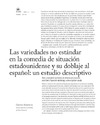Please use this identifier to cite or link to this item:
https://accedacris.ulpgc.es/jspui/handle/10553/72643
| Title: | Las variedades no estándar en la comedia de situación estadounidense y su doblaje al español un estudio descriptivo | Other Titles: | Non-standard varieties in American sitcoms and their Spanish dubbing: a descriptive study | Authors: | Arampatzis , Christos | UNESCO Clasification: | 570112 Traducción | Keywords: | Situation Comedy Prefabricated Orality Language Variation Translation Strategies And Tendencies Comedia de situación, variación lingüística, estrategias y tendencias de traducción, et al |
Issue Date: | 2013 | Journal: | TRANS. Revista de Traductologia | Abstract: | When it comes to the creation of humorous sequences or to character building within an audiovisual fiction text, dialects and accents turn out to be one of the most valuable resources for scriptwriters. Bound as they are to a specific society and culture, these varieties instantly rouse the researcher's curiosity as to how they could be dealt with by translators. This article sets out to shed some light on the issue by summarising the findings of a descriptive study carried out on the use of language variation in two American sitcoms, Friends and Will & Grace, both in their original and their Spanish dubbed version. In keeping with the goals outlined at the outset of this research, two sets of conclusions have been reached: one on linguistic varieties in the source text, their frequency, function and underlying stereotypes; and another on dubbing strategies through which dialect-marked fragments are translated, with a view to identifying a series of translation tendencies vis-a-vis language variation in audiovisual fiction texts. Cuando se trata de crear secuencias humorísticas o de caracterizar a cierto personaje en un texto audiovisual de ficción, los dialectos y acentos se revelan como uno de los recursos más empleados por los guionistas. Dada la especificidad sociocultural de las variedades lingüísticas no estándar, resulta de interés examinar cómo proceden los traductores ante su presencia en un texto audiovisual. Este artículo resume los hallazgos de un estudio descriptivo realizado sobre la variación lingüística en comedias de situación estadounidenses y su traducción para el doblaje al español. El corpus de la investigación consta de la totalidad de los capítulos de las series Friends y Will & Grace en versión original y en versión doblada al español. De acuerdo con los objetivos delimitados en la fase inicial del trabajo, la investigación llevada a cabo ha llegado a dos series de conclusiones: por un lado, ha arrojado luz sobre las variedades empleadas en la versión original, su frecuencia de empleo, la función que cumplen en el texto y los estereotipos a los que suelen remitir; por otro lado, se ha obtenido información sobre las estrategias utilizadas en el doblaje de fragmentos que contienen estas variedades, con ánimo de identificar tendencias de traducción frente al fenómeno en cuestión. |
URI: | https://accedacris.ulpgc.es/handle/10553/72643 | ISSN: | 1137-2311 | Source: | Trans-Revista De Traductologia [ISSN 1137-2311] (17), p. 85-102 |
| Appears in Collections: | Artículos |
SCOPUSTM
Citations
8
checked on Jun 8, 2025
Page view(s)
121
checked on May 31, 2025
Download(s)
111
checked on May 31, 2025
Google ScholarTM
Check
Share
Export metadata
Items in accedaCRIS are protected by copyright, with all rights reserved, unless otherwise indicated.
